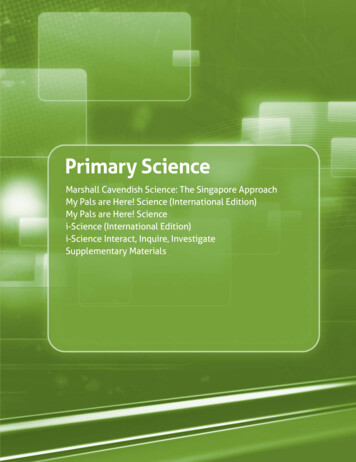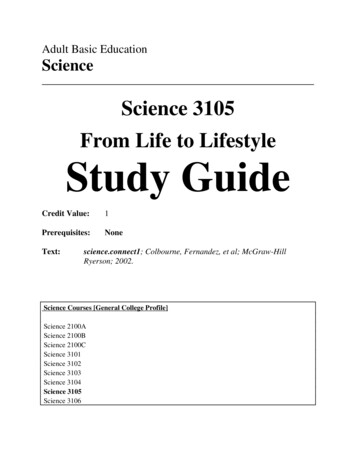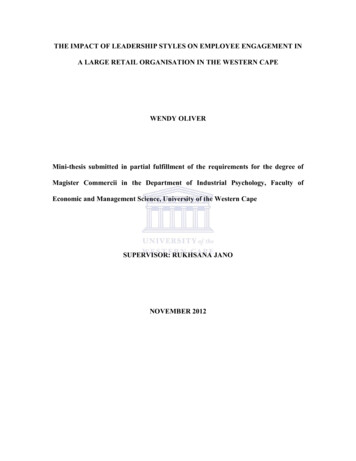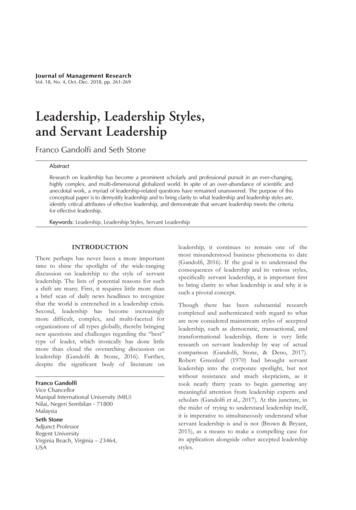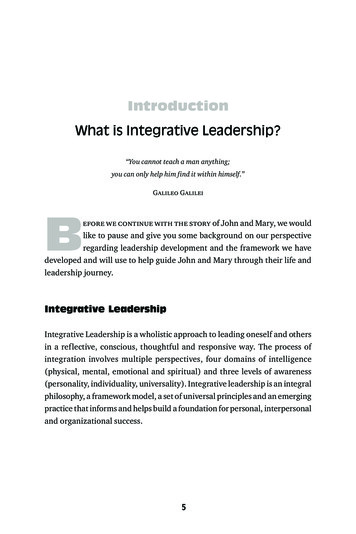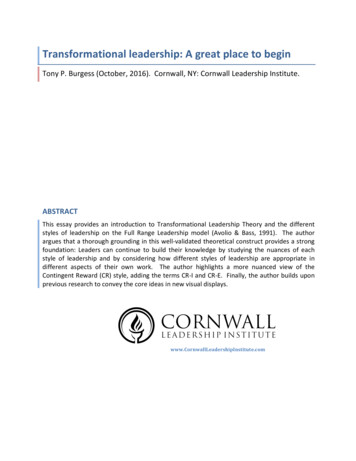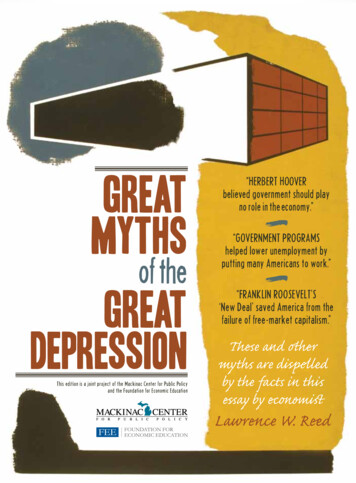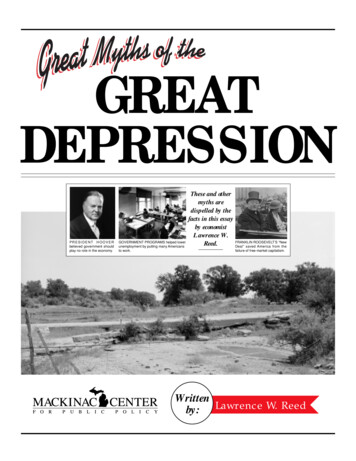
Transcription
Great science leadershipat primary school1
or excellent primary science,Fschools need the time,expertise and resources todeliver engaging and thoughtprovoking science lessons.2
Why should wecare about science?Good leadership of science is essentialat primary school. Here’s supportfor you as a science leader.The short answer is because science is a coresubject in the national curriculum (in England).But science is much more than just a compulsorysubject: science inspires children, encouragingthem to be inquisitive about the world,nurtures their innate curiosity and enablesthem to develop a range of skills that areuseful across their learning.In 2013 we conducted an online survey to findout how PSLs are deployed in schools. Theresponses and follow-up case studies, writtenup in a report available on our website1, releaseda wealth of information and advice that can helpsupport you as a science leader, whether youare new-in-post or at a school that is lookingto improve its science teaching.By the end of primary education, children startto make up their minds about whether scienceis for them. We think science is for everyone,not just those who want to continue intoscience-based careers; having an understandingof science allows people to make informeddecisions about new technologies, theirhealth and other important matters.We know that taking on responsibility forleading science may be your first taste ofleadership, and that like many primary teachersyou may not have a strong science background.However, this need not be a barrier to leadingexciting primary science – there is supportto help you develop expertise in both teachingand leadership.We should all champion primary scienceand make sure that every child has a positiveexperience of science throughout theirprimary school education.This booklet will help you get started by leadingyou to reflect on science in your school andbegin planning its improvement. You’ll thinkabout your shared vision, how you shoulddevelop and use your science expertise, andhow you can evaluate the science curriculum.Good leadership of science is essentialat primary school. This booklet providessupport for you as a primary science leader(PSL), based on good practice in schoolsthat value science.3
“ The model chosen(for science teachingand leadership)makes the best useof the skills of eachmember of staff.”24
How is science ledin primary schools?Very few schools employ a specialist scienceteacher who leads and teaches all the sciencein the school.In most schools science is taught by classteachers, one of whom takes on the role ofscience leader. But there are variations of thismodel, which reflect different schools’ contextsand priorities for strategic improvement in science.Schools that give science a high profileuse rigorous self-evaluation to choosewhich leadership model is most appropriatefor them. Our report, The Deploymentof Science and Maths Leaders in PrimarySchools (2013), explores the advantagesof the different models in detail3.Models for science delivery and leadershipWHICH MODELIS USED?WHO LEADSSCIENCE?WHO TEACHESSCIENCE?ScienceteachermodelClass teacher modelScienceleaderScienceleaderand deputyScienceleaderand teamClass teachersScienceleaderand scienceteacherScienceleaderand residentscientistScienceteacherScienceteacher5
What expertise does a goodscience leader need?“It’s the science leader’s responsibilityto stay up to date on CPD andto identify appropriate courses.”4A PSL should value science, understanding theimportance and relevance of science in our livesand recognising that teaching and learning sciencedevelops skills and ideas that can be either specificto science or applied across the curriculum.They should: keep up to date with broad developments in scienceand science education, and consider how to sharethese with colleagues and pupils when appropriate be aware of, and take responsibility for,developments that affect school sciencepolicy, including health and safety be aware of, and take responsibility for,addressing gender stereotyping in sciencelessons and enrichment activities implement a whole-school vision for science,and advise and support colleagues on thepedagogy and appropriate resources toachieve it ensure that they access continuingprofessional development (CPD) forleadership of science, and that colleaguesaccess CPD to address their requirements too m onitor provision of science and pupils’ progress,and contribute to the strategic developmentof learning in school.6Subject knowledgeA PSL should have a deep understanding of thescientific concepts within the primary sciencecurriculum, supported by an understanding ofprogression into the next phase of education.They should identify any gaps in their knowledgeor weaker areas of understanding of the scientificmethod, and address these through appropriatesources, including good CPD.They should understand the differentmethodologies for science enquiry and whento use them, including appropriate methods forrecording and presenting different types of data.They should be confident in the use of scientificvocabulary related to the curriculum and able toexplain these terms to colleagues.Pedagogical knowledgeA PSL should have secure knowledge of, andbe able to apply and model, an appropriaterange of methods suitable for teaching across allphases in their school. Their knowledge shouldinclude enquiry-based teaching and learningmethods, practical activities, out-of-classroomlearning, independent and group work, problemsolving, and digital technologies. They shouldhave secure understanding of both formativeand summative assessment practices forprimary science, and evaluate outcomes tomonitor the impact of science teaching andlearning on pupils.
7
What does a goodscience leader do?A good science leader ensures that all pupilscan develop their understanding of the bigideas of science, and learn the skills neededto work like a scientist, because their teachersare confident practitioners who deliver anenquiry-rich curriculum with access toappropriate resources.They plan improvement that: builds their school’s science curriculum raises standards for pupils leads colleagues to teach science better.Most science leaders manage resources,support science curriculum development,monitor teaching quality and pupil achievement,and lead staff meetings to share ideas and skills.But less than a third are involved directly instrategic planning and development within theirschools, despite this being essential to raisingthe profile of science and the achievement ofpupils. Science leaders are able to develop awhole-school vision for science when schoolleadership teams value science as a coresubject that builds skills across the curriculumand include it fully in strategic planning.Questions on science leadership What is the whole-schoolvision for science? How do you monitor it?8 How does it link strategicallywith the school improvementplan? How is science expertiseused in your school toteach and to lead science? What provision do you needto develop your expertise andkeep your skills up to date?
“ Children love thehands-on natureof the subject and theopportunities to reallyget involved in big,practical experimentsusing scientificequipment.” 59
How does good science leadershipimprove science teaching?Many new science leaders tell us that theirfirst task is to organise their current resources.It’s a good place to start – you need to knowwhat you have – but there’s more to it than that.Children need to develop independent learningskills and the ability to design their owninvestigations and take measurements withincreasing accuracy. They should be able toselect the resources and equipment they needto do this. Teachers also need to have confidencein using the resources themselves and knowhow to do so safely.Science doesn’t just take place in theclassroom either. Children need to exploredifferent environments – this is vital for allstrands of science, not just biology. Accessto a suitable range of environments is essential.Some schools make use of partnerships orschemes to help them develop outdoor learningenvironments or enrich their curriculum6.Free loans of equipment, such as microscopes,and visits from local scientists provide a richexperience for children too.Our published case studies7 highlightthe strategic ways that science leadershave developed their curricula beyondthe statutory minimum, making scienceexciting and inspiring for pupils, teachersand parents8. These schools have a visionfor science that is shared by the wholeschool community.Raising standards for pupilsMonitoring teaching, pupil achievement andprogress in science is essential, but theoutcomes of this monitoring should be usedstrategically to secure even better science.10 data analysislearning walksmoderating assessmentobserving lessonsplanningpupil focus groupsteam meetingswork scrutinyother ideasMany teachers worry about assessment inscience. If a teacher is not secure about scienceconcepts, can their assessment be accurate?A child might use a key word that suggestsunderstanding but unless probed further,mastery cannot be confirmed. Whenassessment is inaccurate children maydevelop misunderstanding or be put offscience, thinking that it is too hard.Assessment needs to be planned carefully andmust be integral to teaching; science leadersneed dedicated management time to work withcolleagues, both in school and in local networks,to develop robust practice.Sometimes science leaders deliver specialistlessons in a trade-off with a teacher leadinganother subject area so that pupils havechallenging science lessons. While this ensuresbetter quality teaching for some lessons, it does notallow pupils to develop their learning across othersubjects or enable teachers to develop their skills insubjects that they are less confident to teach.Team teaching is preferable as it shares teachers’expertise and develops skills that will raise pupils’achievement. Where opportunities for teamteaching are included in strategic planning,teachers are enabled to teach science welland pupils benefit.
Questions for reflecting on the science curriculum How does your sciencecurriculum ensure pupilsdevelop conceptualunderstanding andscience skills? Is the curriculum flexibleenough to encourage childrento ask lots of questionsand investigate? Does it match skilldevelopment in mathsand English? How is assessmentincorporated into planning? Does it make science seemrelevant to the childrenattending your school? What does your sciencecurriculum say about yourvision for science?Questions for reflecting on resourcesand environments for teaching science How do science resourcesin your school comparewith recommendedbenchmarks?9 Do you have what is neededto teach the statutorycurriculum and enable pupilsto work scientifically? What message about scienceis given by the state of theresources? Are they age-appropriate? Are some resources not usedbecause teachers aren’t surehow to use them? Do resources andenvironments enrichand enhance learning? Do you prepare an annualbudget for science thataccounts for consumableitems and the replacementand enrichment of resources?Questions on pupils’ experiences Does science teaching reflectyour whole-school vision forscience? How do pupils developscience skills throughworking scientifically? Are pupils enthusiastic aboutlearning science? How doesattainment in sciencecompare with other coresubjects for all pupils? What strategic actionswould improve learning?11
“ Ensuring that eachclass teacher hasthe best subjectknowledgepossible is thepriority for thescience leader.” 1012
How does a science leader guidecolleagues to teach science better?Science leaders recognise that a whole-schoolvision for science encourages consistencythroughout the school, through shared ownershipand strategic planning. But they also say thatanxiety over weak subject knowledge and lowconfidence in teaching in a scientific way arebarriers to science being as good as it canbe; access to high-quality science CPD is thefactor most likely to help them improve sciencein their schools.New science leaders want to access CPD thatwill equip them with good subject knowledge andpedagogical skills that they can share with theircolleagues. They need time out of the classroomto coach other staff to teach science and mentorthem to increase confidence. One school toldus that after completing high-impact ScienceLearning Centre courses11, their scienceleader would be timetabled for one schoolyear to teach science alongside all otherteachers, to raise science to an ‘outstanding’level in the school. This school valuedsubject-specific CPD and expectedthat it would have a significant impact.A range of CPD is available; you need toaudit your needs against the expected impactto select the most appropriate provision.Science leaders frequently network with oneanother to do learning walks or to moderateassessments. Including colleagues fromsecondary schools helps everyone tounderstand how children progress in scienceand can prevent the overuse of some practicalinvestigations. Online networks are greatfor sharing ideas and solving queries.Questions on leading others in teaching science Which areas of subjectknowledge do colleaguesneed most support with? How confident are teacherswith assessment of science? What methods of supporthave the greatest impacton pupils’ science?How do you know? How does support forcolleagues link with allother aspects of yourleadership role?13
What other supportis out there?Free resourcesNational STEM Learning Centre(stem.org.uk)Primary Science Teaching Trust(pstt.org.uk)Wellcome Trust (wellcome.ac.uk)School supportAssociation for Science Education(www.ase.org.uk)Primary Science Quality Mark(www.psqm.org.uk)1. Wellcome Trust. The Deployment of Science and Maths Leadersin Primary Schools. London: Wellcome Trust; 2013.wellcome.ac.uk/sites/default/files/wtp056231 1.pdf2. Wellcome Trust. The Deployment of Science and Maths Leadersin Primary Schools. London: Wellcome Trust; 2013, 29.wellcome.ac.uk/sites/default/files/wtp056231 1.pdf3. Wellcome Trust. The Deployment of Science and Maths Leadersin Primary Schools. London: Wellcome Trust; 2013.wellcome.ac.uk/sites/default/files/wtp056231 1.pdf4. Wellcome Trust. The Deployment of Science and Maths Leadersin Primary Schools. London: Wellcome Trust; 2013, 14.wellcome.ac.uk/sites/default/files/wtp056231 1.pdf5. Wellcome Trust. The Deployment of Science and Maths Leadersin Primary Schools. London: Wellcome Trust; 2013, 26.wellcome.ac.uk/sites/default/files/wtp056231 1.pdf146. Join the Primary Resources community group at stem.org.uk7. Wellcome Trust. The Deployment of Science and Maths Leadersin Primary Schools. London: Wellcome Trust; 2013.wellcome.ac.uk/sites/default/files/wtp056231 1.pdf8. stem.org.uk/primary-science9. SCORE (Science Community Representing Education) hasproduced a set of resourcing benchmarks for teachers and schoolpractitioners to use when planning science budgets and equippingclassrooms. ions-resourcing-benchmarks10. Wellcome Trust. The Deployment of Science and Maths Leadersin Primary Schools. London: Wellcome Trust; 2013, 26.wellcome.ac.uk/sites/default/files/wtp056231 1.pdf11. stem.org.uk/primary-science
15
Wellcome exists to improvehealth for everyone byhelping great ideas to thrive.We’re a global charitablefoundation, both politicallyand financially independent.We support scientists andresearchers, take on bigproblems, fuel imaginationsand spark debate.Wellcome Trust, 215 Euston Road, London NW1 2BE, United KingdomT 44 (0)20 7611 8888, E contact@wellcome.ac.uk, wellcome.ac.ukThe Wellcome Trust is a charity registered in England and Wales, no. 210183.Its sole trustee is The Wellcome Trust Limited, a company registered in England and Wales, no. 2711000(whose registered office is at 215 Euston Road, London NW1 2BE, UK). E-6681/500/12-2016/LP16
We should all champion primary science and make sure that every child has a positive experience of science throughout their primary school education. Good leadership of science is essential at primary school. This booklet provides support for you as a primary science leader (PSL), based on good practice in schools that value science.
